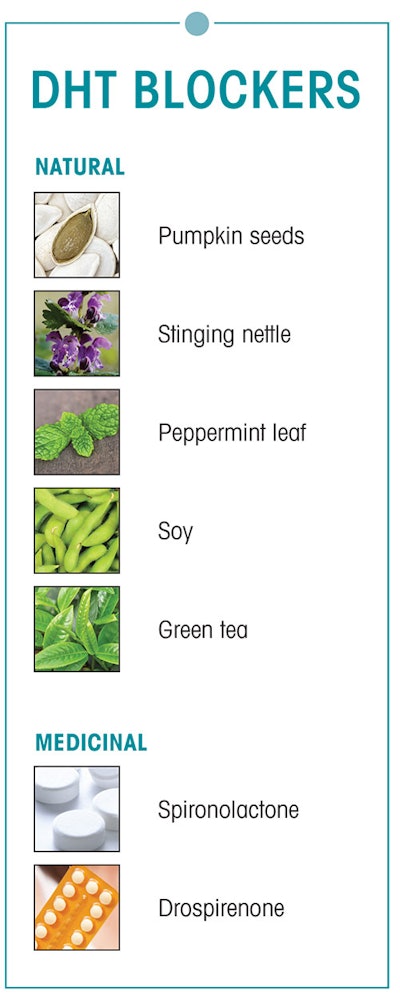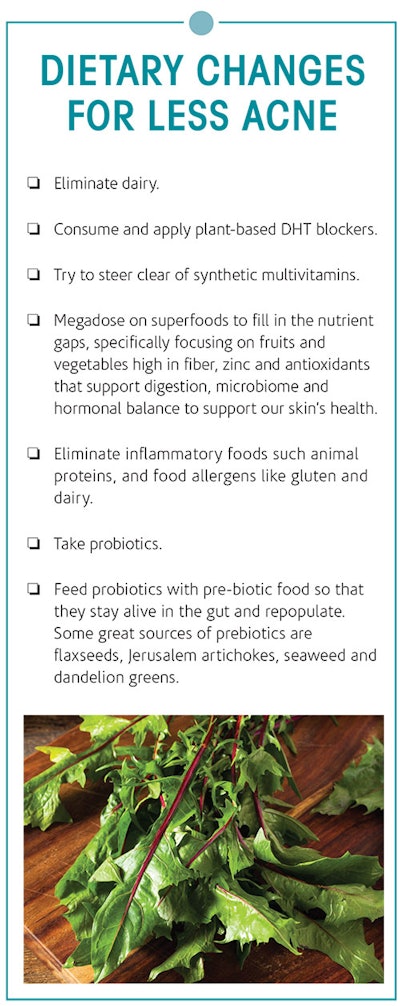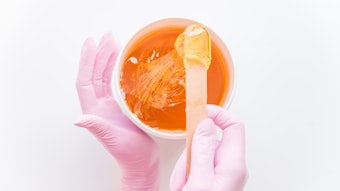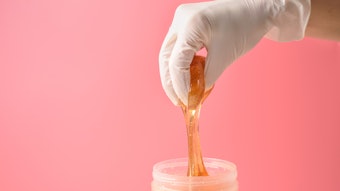
Every day we are discovering more about nutrition and the key role it plays in our skin’s overall health. Our skin is a direct reflection of our dietary choices, lifestyle habits and imbalances, as well as the skin care we are using on a daily basis. Too often, all types of acne are treated the same way—kill the bacteria with antibiotics, exfoliate the skin with potentially harsh treatments and dry out the sebaceous glands. However, are we reaching for the branches of the problem instead of getting to the root of acne’s causes?
When it comes to acne and our diet, it can be broken down into three primary influences: hormones, nutrient deficiencies and the microbiome. All of these are tightly interconnected, with each greatly influencing another. For example, diet and potential nutrient deficiencies can influence a human’s microbiome balance, which in turn can affect hormones. In the same paradigm, nutrient deficiencies can also determine if the human body is creating the hormones needed to regulate the skin’s key functions, including sebum production and the inflammatory response. The microbiome (or bacterial balance) can also affect how well the human body is absorbing the nutrients needed to have healthy, balanced skin.

1. Hormones
Hormones, by definition, are “Chemical messengers that travel throughout the body coordinating complex processes like growth, metabolism and fertility. They can influence the function of the immune system, and even alter behavior. Before birth, they guide development of the brain and reproductive system.”1 In other words, hormones control virtually everything and our dietary choices can influence them greatly.
Dihydrotestosterone (DHT) is a potentially negative type of androgen or testosterone-like hormone, with links to hair loss in men and women as well as acne. DHT can also increase sebum production and inflammation in the skin, leading to the creation of a blocked follicle which becomes a low oxygen, breeding ground for P. acnes bacteria. Once again, a lot of conventional treatments for acne reach for the branches of the problem rather than the root, as many dermatologists recommend antibiotics as a primary treatment to treat acne. This only wipes out the bacteria that can create breakouts, rather than treating a potential root cause—DHT.
There are some natural ways that our clients can block DHT, both topically and internally. A number of plants (see DHT Blockers) are effective DHT blockers, but unfortunately this still doesn’t solve the problem if we are continuing to ingest and stimulate DHT through other sources. Dairy is often the missing link in solving this issue, as many of our clients with acne are dairy lovers.
Dairy. Arguably, the biggest culprit when it comes to diet-influencing hormones that can create acne is dairy. Dairy has a lot of things working against it when it comes to the overall health of skin. Specifically, dairy increases DHT. Dairy also naturally contains sugar and casein, a large molecule protein which many people find difficult to break down and digest. These factors can also influence the formation of acne in the skin.
There is no such thing as hormone-free dairy products. The labels with the wording “no hormones” in big, bold lettering can be misleading. This labeling only means that no hormones have been added, when in reality there are at least 60 hormones contained in a single glass of cow’s milk that occur innately. In the case of chronically and conventionally untreatable acne, it is important that skin care professionals continue to work as a team with dermatologists rather than fight them. A dermatologist can run the necessary blood tests to determine if DHT levels are imbalanced, as well as prescribe more powerful DHT blockers, if needed. Spironolactone and drospirenone are DHT blockers and anti-androgen medications that have been shown in clinical studies to be helpful in the treatment of acne.2

Sugar. Sugar has been a widely discussed topic in the esthetics forum when it comes to glycation and aging; however, sugar can be another power player in the process of skin breakouts. High glycemic foods cause a spike in insulin, a hormone that controls blood sugar levels. There is evidence that insulin also stimulates an enzyme called 5-alpha reductase,3 which is an enzyme that converts testosterone to the potentially harmful DHT, in turn causing increased breakouts and oil production. Sugar also increases insulin growth factor-1 (IFG-1),4 which is also a hormone that has been linked to acne and other diseases in multiple studies.5-6
2. Inflammatory Foods
Gut inflammation can lead to malabsorption of nutrients and a nutrient deficiency. Addressing gut inflammation in a way is easy—eliminate inflammatory foods. Inflammatory foods can include dairy, as discussed previously, as well as other animal proteins (red meat, chicken, turkey, pork). Another group of inflammatory foods are processed food and sugars, as well food allergens, such as gluten and dairy. Your clients can work with a gastrointestinal doctor or food allergy specialist to identify their specific allergens through allergen-specific IgE blood testing (previously referred to as RAST or ImmunoCap testing). This is the most accurate testing on the market and will help to identify potential food allergens playing a role in the inflammation of the skin and body.

Dairy. Casein is one of the primary proteins found in all animal sources of dairy, and a specific type of casein, alpha s1 casein, has been identified as a major allergen.7-8 Although both goat’s and sheep’s milk contain a similar type of casein, there is anecdotal evidence that replacing cow’s milk (and their by-products) with goat or sheep’s milk in the diet is a hypoallergenic option, with marked improvement in eczema, digestive disorders, asthma as well as other inflammatory conditions, including acne.9-10 With casein also being a large molecule protein that is difficult to digest, our bodies could potentially not break down this protein, destroying our gut lining and allowing these proteins to enter the blood stream. This can lead to more inflammation of the body as our immune system attacks these proteins.
Animal protein. Eliminating animal proteins (with the exception of wild-caught fish due to the healthy, anti-inflammatory fats they naturally contain) will go a long way toward lowering inflammatory levels in the body. There are many clinical studies pointing to animal proteins being a serious culprit in negatively influencing the inflammatory response of the body. All of the amino acids, nutrients and proteins found in meat can be obtained from plant-based, complete protein sources such as peas, black beans and hemp seeds.

3. Probiotics and Prebiotics
The most talked about topic in reference to our microbiome is probiotics. Probiotics are healthy types of bacteria that can be used externally to help bring back balance to the microbiome on our skin, as well as taken internally to bring back balance to the microbiome of our digestive tract. Many choices in our internal diet can affect the delicate balance of this healthy bacteria. Pesticides and antibiotics can destroy this delicate balance. While taking probiotics internally is important, perhaps the most overlooked topic when it comes to probiotics are prebiotics.
Prebiotics are fibers and carbohydrates that function as food for good bacteria, allowing them to proliferate and repoplate. Many Americans eat a low-fiber diet, and this doesn’t support our healthy bacterial balance. Foods such as seaweed,11 dandelion greens-12-13 Jerusalem artichokes,14 chicory root15 and flaxseeds16 all have studies showing that their prebiotic fiber content can help to repopulate the gut with healthy bacteria and have a multitude of health benefits, including better digestive health, boosting the immune system and reducing inflammation.
Why do we need probiotics when it comes to our skin’s health and acne? Probiotics regulate the immune system,17 an important part of how skin deals with potential bacterial infections and the body’s overall skin’s defense. Probiotics also play a role in our overall nutrient absorption, energy metabolism, immunity and intestinal barrier function.18 In other words, without a dense and vast variation of probiotic cultures in our digestive tract, we can’t absorb the nutrients we need from the food we eat. We also can’t fight infection, control inflammation or regulate our response to food allergens. This not only results in a decline in our overall health and ability for our cell to function optimally, but will also affect hormonal balance in the body and how our bodies deal with potential stressors.
Putting It All Together
With all of this information and different treatments on the market, trying to treat acne can look like a seemingly impossible, complicated task. It may seem overwhelming; however, all of these are simple changes we can help our clients and ourselves take in treating acne. For a cheat sheet of key factors skin care professionals can use to treat acne differently, see Dietary Changes for Less Acne. Taking a broader look at acne and making these recommendations can make drastic changes both for you and your clientele.
References
- www.pbs.org/wgbh/pages/frontline/shows/nature/etc/hormones.html
- A Krunic and A Ciurea, Scheman A Efficacy and tolerance of acne treatment using both spironolactone and a combined contraceptive containing drospirenone, J Am Acad Dermatol 58(1) 60-2 (2008)
- PP Kayampilly , BL Wanamaker, JA Stewart, CL Wagner and KM Menon, Stimulatory effect of insulin on 5alpha-reductase type 1 (SRD5A1) expression through an Akt-dependent pathway in ovarian granulosa cells, Endocrinology, 151(10) (2010)
- BC Melnik, SM John and G Schmitz , Over-stimulation of insulin/IGF-1 signaling by western diet may promote diseases of civilization: lessons learnt from laron syndrome, Nutr Metab (Lond) 8 41 (2011)
- H Aizawa and M Niimura, Elevated serum insulin-like growth factor-1 (IGF-1) levels in women with postadolescent acne, J Dermatol 22(4) 249-52 (1995)
- M Cappel, D Mauger and D Thiboutot, Correlation between serum levels of insulin-like growth factor 1, dehydroepiandrosterone sulfate, and dihydrotestosterone and acne lesion counts in adult women, Arch Dermatol 141(3) 333-8 (2005)
- P Spuergin, H Mueller, M Walter, E Schiltz and J Forster, Allergenic epitopes of bovine alpha S1-casein recognized by human IgE and IgG, Allergy 51(5) 306-12 (1996)
- B Ruiter et al, Role of human leucocyte antigen DQ in the presentation of T cell epitopes in the major cow’s milk allergen alphas1-casein, Int Arch Allergy Immunol 143(2) 119-26 (2007)
- YW Park, Small Ruminant Research 14 151–159 (1994)
- GFW Haenlein, Small Ruminant Research 51 155–163 (2004)
- O’Sullivan et al, Prebiotics from marine macroalgae for human and animal health applications, Mar Drugs 8(7) 2038-64 (2010)
- Clare BA1, Conroy RS, Spelman K.J Altern, The diuretic effect in human subjects of an extract of Taraxacum officinale folium over a single day, Complement Med. 2009 Aug;15(8) 929-34. doi: 10.1089/acm.2008.0152.
- M González-Castejón, F Visioli and A Rodriguez-Casado, Diverse biological activities of dandelion, Nutr Rev Sep 70(9) 534-47 (2012)
- L Samal, VB Chaturvedi, G Saikumar, R Somvanshi and AK Pattanaik, Prebiotic potential of Jerusalem artichoke (Helianthus tuberosus L.) in Wistar rats: Effects of levels of supplementation on hindgut fermentation, intestinal morphology, blood metabolites and immune response, J Sci Food Agric Jun 95(8) 1689-96 (2015)
- M Nishimura et al, Effects of the extract from roasted chicory (Cichorium intybus L.) root containing inulin-type fructans on blood glucose, lipid metabolism, and fecal properties, J Tradit Complement Med Jan 20 5(3) 161-7 (2015)
- P Kajla, A Sharma and DR Sood, Flaxseed-a potential functional food source, J Food Sci Technol, 52(4) 1857-71 (2015)
- J Benyacoub, N Bosco, C Blanchard, A Demont, D Phillippe and I Castiel-Higounenc, Immune modulation property of Lactobacillus paracasei NCC2461 (ST11) strain and impact on skin defenses, Benef Microbes 5 129–136 (2014)
Probiotics play an important role in how the skin deals with potential bacterial infections that can cause acne.












